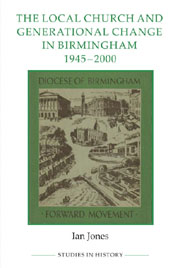Book contents
- Frontmatter
- Contents
- List of figures and tables
- Acknowledgements
- Abbreviations
- Map of Birmingham
- Introduction
- 1 Birmingham: the city and its churches
- 2 The spectre of ‘decline’
- 3 Church, youth and family from the 1940s to the 1960s
- 4 Life and worship in the local congregation
- 5 Church and neighbourhood: four congregational stories
- 6 Towards the margins: being Christian in a pluralist society
- Conclusion
- Appendix: Oral history
- Bibliography
- Index
6 - Towards the margins: being Christian in a pluralist society
Published online by Cambridge University Press: 05 February 2013
- Frontmatter
- Contents
- List of figures and tables
- Acknowledgements
- Abbreviations
- Map of Birmingham
- Introduction
- 1 Birmingham: the city and its churches
- 2 The spectre of ‘decline’
- 3 Church, youth and family from the 1940s to the 1960s
- 4 Life and worship in the local congregation
- 5 Church and neighbourhood: four congregational stories
- 6 Towards the margins: being Christian in a pluralist society
- Conclusion
- Appendix: Oral history
- Bibliography
- Index
Summary
Reviewing in her sixties, the changes that she had seen during her lifetime, Sheila Robertson of St George's, Edgbaston, reflected that
An awful lot of earth-shattering things have happened on an awful scale – it's a very different world from the one we were born into – even got married into.
Interviewer: What do you think are the big … [changes]?
The moral certainties. We grew up in a world where whether or not you went to church, there was still the basic framework – the Ten Commandments, I suppose … You knew where people came from, whereas now you haven't a clue with their attitudes and beliefs … it's endlessly making allowances for other people without really knowing what allowances have to be made.
Few historians and sociologists would deny that the increasingly religiously and culturally pluralistic turn of postwar society posed major challenges to Christianity's historic influence. In part, pluralism was the consequence of a long-term tendency for social and political elites to take an increasingly ‘permissive’ stance on questions of personal morality and the growing reluctance of these elites to endorse Christian norms and values above others. A social and political ideal of ‘Christian nationhood’ progressively gave way to one of ‘civilised society’, a concept with a variety of intellectual and cultural inspirations, and less conscious debt to Christianity. However, increased cultural pluralism was also underpinned by growing individual self-assertion which, if it did not exactly result in the pure individualism predicted by some classical sociologists, nevertheless reflected the triumph of an ‘ethic of authenticity’ which understood the ‘self’ as the ultimate source of authority.
- Type
- Chapter
- Information
- Publisher: Boydell & BrewerPrint publication year: 2012

